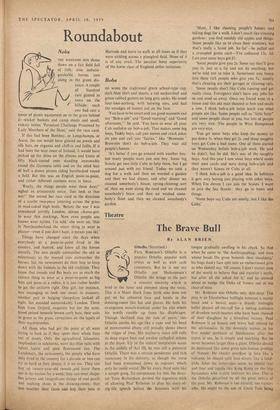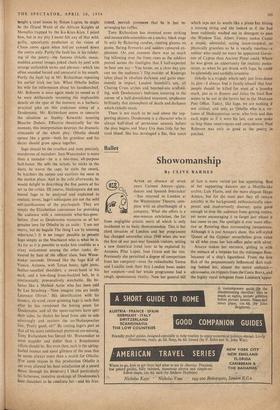Theatre
The Brave Bull
By ALAN BRIEN Othello. (Stratford.)
PAUL ROBESON'S Othello is a popular Othello, popular with critics as Well as with cash customers. But he is not my Othello nor Shakespeare's Othello. He brings to the part a massive sincerity which is bred in the bone and pumped along the veins. This is a Moor black from birth who does not put on his coloured face and hands in the dressing-room like hat and gloves. He feels his strangeness muscle-knotted under his ribs where his words rumble up from his diaphragm. 'Though 'declined into the vale of years,' this Othello carries his age like a cape and his head of monumental ebony still proudly shows above the ridges of time. His mulberry voice still rolls its deep organ bass and awakes cathedral echoes in the foyer. Up to the central temptation scene in the middle of Act III, he was still a potential Othello. There was a certain ponderous and rich monotony in his delivery, as though the verse had been transposed down to registers which only he could sound. He hit every third note like a temple gong. To compensate for this, the direc- tor Tony Richardson devised the ingenious trick of allowing Paul Robeson to play his story-of- my-life speech before the Senators with his
tongue gradually swelling in his cheek. So that when he came to 'the Anthropophagi, and men whose heads Do grow beneath their shoulders,' his huge dusky face split into an embarrassed grin as who should say, 'Of course, I don't expect men of the world to believe that old traveller's myth, but after all she asked for it,' and he seemed about to nudge the Duke of Venice out of his chair of state.
Mr. Robeson was Othello only skin-deep. The play is an Elizabethan bullfight between a manly beast and a bestial man—a bloody midnight ballet played off-the-ruff for a reeling audience of drunken torch-bearers who have been cheated of their slaughter by a bloodless victory. Paul Robeson is an honest and brave bull adored by the aficionados. In the domestic scenes,‘ in his first tender embrace of Desdemona after the storm at sea, he is simple and touching. But he never becomes larger than a giant. Othello should be destroyed like some great non-human prodigy of Nature. He should overflow in lava like a volcano, he should split into slivers like a land- slide. After the temptation scene, he should rear and roar and topple like King Kong on the tiny bystanders who scuttle between his toes. This is the Othello .described by all the great critics of the past. Mr. Robeson is too natural, too vulner- able. He might be the son of Uncle Tom being taught a cruel lesson by Simon Legree, he might be the Grand Wazir of the African Knights of Memphis trapped by the Ku-Klux-Klan. I pitied him, but in my pity I never felt any of that wild, guilty, apocalyptic exultation at the vision of Chaos come again when hell-pit yawned down the centre aisle. Partly the fault lies in his render- ing of the poetry—the famous Othello music, studded animal images yoked cheek-by-jowl with strange outlandish terms and phrases—which too often sounded forced and unnatural in his mouth. Partly the fault lay in Mr. Richardson repeating his earlier trick too late. When Othello bullies his wife for information about his handkerchief, Mr. Robeson is once again made to sound as if he were deliberately inventing the implausible details on the spur of the moment as a barbaric practical joke on this credulous ninny of a Desdemona. Mr. Richardson seems to conceive the situation as Stanley Kowalski taunting Blanche Dubois. Effective theatrically for the moment, this interpretation destroys the dramatic crescendo of the whole play. Othello should sprout like a genie—both his grandeur and his decay should grow apace together.
lago should be the cruellest and most precisely murderous of matadors. Sam Wanamaker is more than a matador—he is a one-man, all-purpose bull-baiter. He sells the tickets, he sticks in the darts, he waves the cape, he stabs the sword, he butchers the corpse and auctions the meat in the market place. And in the café afterwards, he would delight in describing the fine points of his art to the critics. Of course, Shakespeare did not intend lago to be analysed and explained in realistic terms. lago's soliloquies are not the wild' self-justifications of the psychopath. They are simply the Elizabethan convention for providing the audience with a convenient what-has-gone- before. (Just as Desdemona reassures us of her genuine love for Othello by an aside: 'I am not merry, but do beguile The thing I am by seeming otherwise.') It is no longer possible to present lago simply as the. Machiavel who is what he is. As far as it is possible to make him credible as a crazy malcontent among the other ranks, de- voured by hate of the officer class, Sam Wana- maker succeeds. Dressed like the Iago Kid of Venice, Arizona, with Texan boots, tight jeans, leather-tasselled shoulders, a sweat-band at his neck, and a low-slung brass-buckled belt, he is continuously, provocatively watchable. He be- haves like a Method Actor who has been told by Lee Strasberg—'Now imagine you are inside Laurence Olivier.' His identification with his bouncy, sly-eyed, razor-grinning Ina is such that after he has composed the boring poem for Desdemona, and all the spear-carriers have split their sides, he shakes his head from side to side admiringly and mutters the un-Shakespearian line, 'Pretty good, eh?' By cutting lago's part so that all his more intellectual pretences are missing, Tony Richardson has forced Mr. Wanamaker to seem stupider and duller than a Renaissance villain should be. But even then, such is the spring- heeled bounce and nasal glibness of the man that he seems always more than a match for Othello. (For some reason in this production Othello is not even allowed his final satisfaction of a sword thrust through his deceiver.) I liked particularly his lecherous, tentative strokings of Desdemona's bare shoulders as he comforts her—and his frus- trated, peevish pretences that he is just re- arranging her ruffles.
Tony Richardson has invented some striking and memorable ensembles on a smoky, black stage lit only by flickering candles, rippling gleams on gauze, flaring fireworks and sudden coloured ex- plosions. (At one moment there was so much fog billowing over the front rows as the soldiers peered across the footlights that I half-expected to hear one say—`You know, on a clear day you can see the audience.') The murder of Roderigo takes place in absolute darkness and gains enor- mously in impact. Loudon Sainthill's sets, all Charing Cross arches and bombed-site scaffold- ing, with Desdemona's bedroom teetering in the corner of a half-demolished tenement, emphasise brilliantly that atmosphere of death and darkness which Othello needs.
There is not much to be said about the sup- porting players. Desdemona is a character who is always half-dead of pernicious anemia before the play begins and Mary Ure does little for her tired blood. She has developed a flat, thin voice which taps out its words like a piano key hitting a missing string and she looked as if she had been ruthlessly washed out in detergent to pass the Window Test. Albert Finney makes Cassio a stupid, adenoidal, acting lance-corporal, as physically graceless as he is vocally tuneless—a soldier who could no more be appointed Gover- nor of Cyprus than Ancient Pistol could. Where he was given an opportunity for realistic panto- mime, as when he got drunk with lago, he could be splendidly and sordidly inventive.
Othello is a tragedy which only just lives down its plot—I always find it faintly absurd that four people should be killed for want of a laundry mark, just as in Romeo and Juliet the fatal flaw seems to be not in the lovers but in the Mantuan Post Office. Today, like lago, we are nothing if not critical, and only an Othello who is a vir- tuoso of Shakespearian verse, who lives and dies each night as if it were his last, can now make us leap those contrivances and coincidences. Paul Robeson was only as good as the poetry io patches.















































 Previous page
Previous page